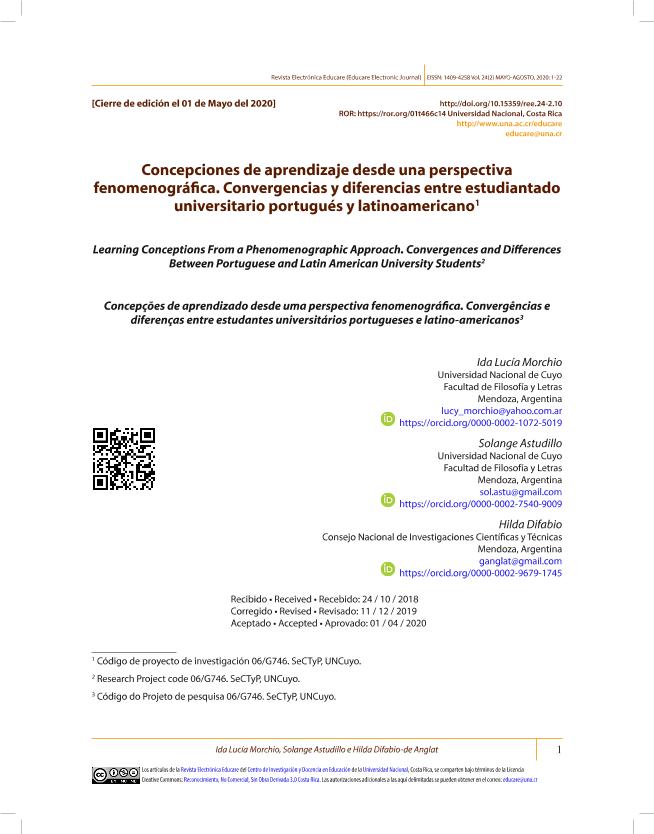Mostrar el registro sencillo del ítem
dc.contributor.author
Morchio, Ida Lucia

dc.contributor.author
Astudillo, Solange
dc.contributor.author
Difabio, Hilda Emilia

dc.date.available
2021-09-07T15:55:56Z
dc.date.issued
2020-05
dc.identifier.citation
Morchio, Ida Lucia; Astudillo, Solange; Difabio, Hilda Emilia; Concepciones de aprendizaje desde una perspectiva fenomenográfica. Convergencias y diferencias entre estudiantado universitario portugués y latinoamericano; Universidad Nacional de Costa Rica; Revista Electronica Educare; 24; 2; 5-2020; 1-22
dc.identifier.issn
1409-4258
dc.identifier.uri
http://hdl.handle.net/11336/139820
dc.description.abstract
Este artículo reseña un estudio en el que se indagan las concepciones de aprendizaje en estudiantado latinoamericano que cursa una misma carrera (Ciencias de la Educación/Pedagogía), a fin de poner en relación los resultados con los obtenidos por Rosário et ál. (2006) en Portugal. El objetivo de la investigación que se informa es ponderar los alcances y límites de aplicar el sistema categorial de los autores nombrados a las concepciones de aprender extraídas en diferentes contextos. Ambas investigaciones comparten un enfoque fenomenográfico, pero difieren en la población y en el instrumento.La nuestra se realizó en 264 estudiantes que cursaban el tramo inicial o final de la carrera en Argentina (Universidad Nacional de Cuyo), Brasil (Universidad Federal de Río de Janeiro y Universidad Estadual Paulista) y México (Universidad de Colima), mediante un ítem abierto del Inventario de concepciones y experiencias de aprender en la universidad (INCEAPU). El trabajo de Rosário et ál. (2006) se realizó en 16 estudiantes de la Universidad de Évora a través de entrevistas individuales. Los hallazgos ponen de manifiesto algunas concepciones compartidas, otras semejantes, pero no idénticas y otras distintivasde la muestra en análisis, lo que lleva a concluir que, si bien se reconocen similitudes y solapamientos, también se destacan particularidades en función del contexto educativo. Por otra parte, sugieren que las concepciones adquieren un sentido bidireccional, pues aunque se inician en el estudiantado y condicionansu actuar frente a la propuesta didáctica, dicha propuesta incide en lo que el estudiantado entiende por aprender. Es relevante indagar las concepciones de aprendizaje en las palabras del alumnado porque, si la universidad se compromete con el respeto por la diversidad, lo primero es conocer en qué consiste lo diverso en términos de las diferentes formas en que sus estudiantes entienden lo que es aprender.
dc.description.abstract
This paper describes a study about the empirical conceptions that a group of Latin American students, attending the same career (Learning sciences/Pedagogy), has about learning to relate the results with those obtained by Rosário et al. (2006) in Portugal. This research aims to weigh the scopes and limits of applying the categorial system developed by the authors to conceptions of learning obtained from different contexts. Both research works share a phenomenological approach, but they differ in population and instrument. Our research was conducted on 264 students -attending the initial or the final courses of their careers in Argentina (National University of Cuyo), Brazil (Federal University of Rio de Janeiro and Paulista State University) and Mexico (University of Colima)-, using an open item of the Inventory of Learning Conceptions and Experiences at University (INCEAPU). The work of Rosário et al. (2006) was applied to 16 students of the University of Évora through individual interviews. Findings show shared conceptions, some similar but not identical categories, and other categories that are different from the sample under analysis. Therefore, it can be concluded that, although some similarities and overlaps can be observed, there are also distinctive aspects, according to the educational context. On the other hand, findings suggest that, even though conceptions start on the students’ community and condition their response to the educational tasks, such conceptions become bidirectional, since the teaching methods influence students’ perception of learning. It is relevant to research the learning conceptions in students’ words because, if the university makes a commitment involving respect for diversity, the first issue in question is to know what is “the diverse” in terms of the different ways in which students understand the concept of learning.
dc.format
application/pdf
dc.language.iso
spa
dc.publisher
Universidad Nacional de Costa Rica

dc.rights
info:eu-repo/semantics/openAccess
dc.rights.uri
https://creativecommons.org/licenses/by-nc-nd/2.5/ar/
dc.subject
EDUCATIONAL IMPLICATIONS
dc.subject
LEARNING CONCEPTIONS
dc.subject
PORTUGUESE AND LATIN AMERICAN UNIVERSITY STUDENTS
dc.subject
UNIVERSITIES
dc.subject.classification
Otras Ciencias de la Educación

dc.subject.classification
Ciencias de la Educación

dc.subject.classification
CIENCIAS SOCIALES

dc.title
Concepciones de aprendizaje desde una perspectiva fenomenográfica. Convergencias y diferencias entre estudiantado universitario portugués y latinoamericano
dc.title
Learning Conceptions From a Phenomenographic Approach. Convergences and Differences Between Portuguese and Latin American University Students
dc.title
Concepções de aprendizado desde uma perspectiva fenomenográfica. Convergências e diferenças entre estudantes universitários portugueses e latino-americanos
dc.type
info:eu-repo/semantics/article
dc.type
info:ar-repo/semantics/artículo
dc.type
info:eu-repo/semantics/publishedVersion
dc.date.updated
2021-09-01T13:55:07Z
dc.journal.volume
24
dc.journal.number
2
dc.journal.pagination
1-22
dc.journal.pais
Costa Rica

dc.description.fil
Fil: Morchio, Ida Lucia. Universidad Nacional de Cuyo. Facultad de Filosofía y Letras; Argentina
dc.description.fil
Fil: Astudillo, Solange. Universidad Nacional de Cuyo. Facultad de Filosofía y Letras; Argentina
dc.description.fil
Fil: Difabio, Hilda Emilia. Consejo Nacional de Investigaciones Científicas y Técnicas. Centro Científico Tecnológico Conicet - Mendoza; Argentina
dc.journal.title
Revista Electronica Educare
dc.relation.alternativeid
info:eu-repo/semantics/altIdentifier/doi/http://dx.doi.org/10.15359/ree.24-2.10
Archivos asociados
